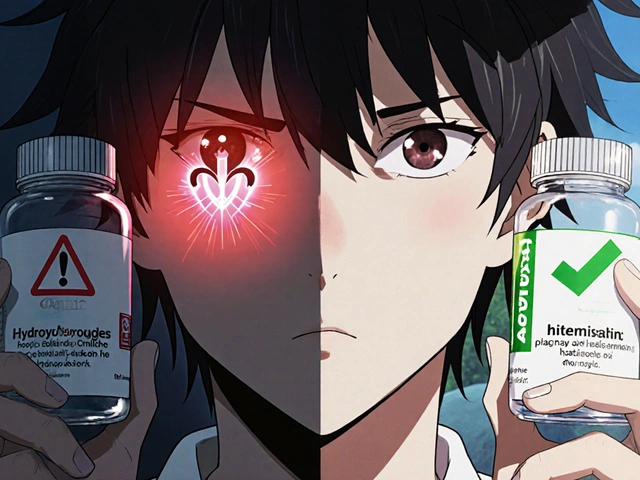Quick take‑away:
- Dapoxetine is a short‑acting SSRI approved for treating premature ejaculation (PE) in many countries, including Australia.
- It’s taken on demand, typically 1-3hours before sexual activity, with a recommended dose of 30mg or 60mg.
- Common side effects are mild - nausea, headache, dizziness - and usually fade after a few weeks.
- Only men with stable relationships and no contraindications should use dapoxetine; always consult a doctor first.
- In Australia you need a prescription from a GP or urologist; online pharmacies can fill it legally if they require a valid prescription.
What is dapoxetine and how does it work?
Dapoxetine belongs to a class called selective serotonin reuptake inhibitors (SSRIs). Unlike typical SSRIs prescribed for depression, dapoxetine is designed to act quickly and wear off within a day. By blocking the re‑uptake of serotonin, it boosts serotonin levels in the brain, which in turn helps delay ejaculation.
The drug’s rapid onset-usually 1‑2hours-makes it suitable for on‑demand use. That’s why it’s marketed under brand names like Priligy in Australia. Clinical trials from the early 2000s showed that men using dapoxetine could increase their intravaginal ejaculatory latency time (IELT) by an average of 2‑3minutes compared with placebo.
Who should consider dapoxetine?
Dapoxetine is approved for adult men (18years and older) who experience lifelong or acquired premature ejaculation that causes distress. It’s not a cure‑all; the drug works best when paired with communication and, if needed, behavioural techniques.
Before a doctor writes a script, they’ll check for several red flags:
- History of heart disease, uncontrolled hypertension, or severe liver/kidney impairment.
- Use of other serotonergic drugs (e.g., other SSRIs, triptans, tramadol) because of serotonin syndrome risk.
- Major depressive disorder or other psychiatric conditions that might need a different SSRI regimen.
- Alcohol or substance misuse, as dapoxetine can amplify dizziness or faintness.
If any of these apply, your GP will likely suggest alternative therapies such as topical anesthetics, behavioural counselling, or other prescription options.
Dosage, administration & what to expect
Dapoxetine is sold in two strengths: 30mg and 60mg tablets. The usual starting point is 30mg. If the response isn’t enough after a few weeks, a doctor may increase the dose to 60mg. Here’s a simple flow‑chart to visualise the decision:
| Step | Action |
|---|---|
| 1 | Take 30mg tablet 1‑3hours before sex. |
| 2 | Assess effectiveness after 2‑4 weeks. |
| 3 | If IELT increase <1minute or side effects intolerable → discuss alternatives with doctor. |
| 4 | If modest improvement, tolerable side effects → consider increasing to 60mg. |
| 5 | Re‑evaluate after another 2‑4 weeks. |
Key points to remember while using dapoxetine:
- Never take more than one tablet in a 24‑hour period.
- Do not combine with alcohol-heavy meals; it can worsen dizziness.
- If you miss a dose (i.e., you took it but haven’t had sex), don’t take another tablet later that day.
- Store the tablets at room temperature, away from moisture.

Side effects, safety & how to manage them
Most men experience mild side effects that fade within a few days to weeks. The most frequently reported ones are:
- Nausea (about 13% of users)
- Headache (around 12%)
- Dizziness or light‑headedness
- Diarrhoea or stomach discomfort
Serious adverse events are rare but can include:
- Cardiac arrhythmias - especially in men with existing heart issues.
- Severe anxiety or panic attacks.
- Signs of serotonin syndrome (high fever, muscle rigidity, rapid heartbeat). Seek emergency care if these appear.
Here’s how to minimise discomfort:
- Take the tablet with a light snack rather than on an empty stomach.
- Stay hydrated; a glass of water helps reduce nausea.
- If headache persists, an over‑the‑counter paracetamol is usually safe-but confirm with your pharmacist.
- Schedule a follow‑up appointment after the first month to review tolerance and effectiveness.
Getting dapoxetine in Australia - the practical route
Dapoxetine is a prescription‑only medication in Australia. Here’s the step‑by‑step pathway most people follow:
- Book an appointment with your GP or a urologist. Bring a brief history of the issue; you don’t need to disclose intimate details unless asked.
- The doctor will conduct a quick physical exam and ask about heart health, current meds, and alcohol use.
- If you’re deemed suitable, the doctor will write a script for Priligy (the brand name) or a generic dapoxetine if available.
- Take the script to a pharmacy. In major cities like Melbourne, most chain pharmacies stock it, but you can also use reputable online pharmacies that require the script uploaded.
- After the first prescription, you’ll get a 3‑month supply, enough for on‑demand use. Refills require another short review with your doctor.
Beware of “black‑market” copies sold on shady websites. Those products often contain incorrect dosages or contaminants, posing health risks. Always verify the pharmacy’s accreditation via the Australian Government’s Therapeutic Goods Administration (TGA) portal.
Frequently asked questions
- Can dapoxetine be taken daily? It’s intended for on‑demand use. Daily dosing doesn’t add benefit and may increase side‑effect risk.
- Is it safe to combine with condoms? Yes. In fact, condoms can reduce friction‑related anxiety, complementing the drug’s effect.
- How long does the effect last? Peak plasma concentration occurs 1‑2hours after ingestion, with the drug cleared within 24hours.
- Will it affect fertility? No evidence shows dapoxetine harms sperm count or quality.
- What if I have depression? Since dapoxetine is an SSRI, it could interact with antidepressants. Your doctor will weigh the risks and may choose a different PE treatment.

Next steps - making an informed decision
If you think dapoxetine might help, schedule a brief telehealth consultation with a GP you trust. Bring a list of all current medications and a quick health summary. During the call, ask about:
- Potential interactions with your existing prescriptions.
- Whether a trial of 30mg is appropriate for you.
- What follow‑up schedule they recommend.
After you get the script, compare prices at a few pharmacies-some offer bulk discounts for a 3‑month pack. Finally, keep a simple log of your IELT and any side effects. That data helps your doctor fine‑tune the dose or decide if a different approach is better.
Remember, dapoxetine is a tool, not a magic fix. Pairing it with open communication with your partner and, if needed, behavioural techniques maximises the chance of a satisfying outcome.





Comments (10)